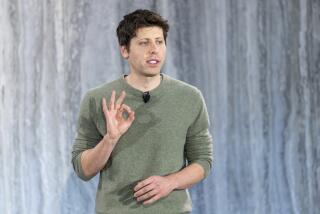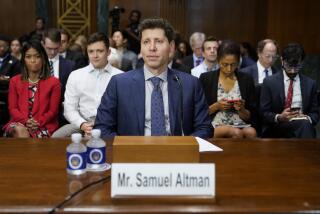The Upheaval at Platinum Software : Computers: The latest problems are not the first that Irvine company founder Gerald Blackie has encountered.
- Share via
IRVINE — Platinum Software Corp. seemed aptly named.
Just last year, with demand for its popular accounting software growing rapidly, Platinum tripled its payroll, made seven acquisitions and reported $39 million in annual revenue.
But with Monday’s announcement that the company’s top managers had resigned and that Platinum had overstated its revenue for 15 months, the company’s explosive growth drew closer attention--as did its architect, Gerald R. Blackie, the firm’s founder, who stepped aside as chairman and chief executive.
As it turns out, Blackie’s first computer venture, Heritage Computing Inc. in Costa Mesa, was sued for copyright infringement in 1983, according to court documents. The suit ended in an out-of-court settlement four years later--by which time Heritage had gone bankrupt.
In 1991, a trade group sued Advanced Business Microsystems Inc.--which became Platinum--for illegally duplicating software. That suit, too, was settled out of court.
Blackie has been unavailable for comment on the recent turn of events.
Carmelo J. Santoro, Platinum’s acting chief executive, described him Thursday as “concerned and sad.”
“He really believes in this company, and he’s proud of what he’s done here,” said Santoro, who is also a Platinum board member and vice chairman of AST Research Inc. in Irvine.
The story of Platinum began, incongruously enough, with sportswear. In the late 1970s, Blackie opened a store in Huntington Beach that specialized in ski paraphernalia: suits, gloves, goggles and masks.
To balance his books, Blackie bought an accounting program made by a Woodland Hills software manufacturer, Occupational Computing Co.--one of the first in the nation to come out with such a product.
Blackie, a handsome New Zealand native who had moved to California a few years before, was so impressed with the software that he offered to market it. According to public records, the 29-year-old entrepreneur signed a contract in January, 1983, granting him a license to manufacture and distribute OCC’s software.
*
About the same time, Blackie opened Heritage Computing. He brought with him three men who formerly had operated the small financial consulting firm that introduced Blackie to OCC’s software: its owner, Brett Wilson, and Wilson’s two right-hand men, Kevin P. Riegelsberger and Timothy J. McMullen.
“Gerald was as charming a person as I have ever met,” said Wilson, now the director of information services for Navicert Financial, a consulting firm in Carson. “He could make you feel that you were the most wonderful, smartest person in the world.”
Within a year, the relationship between OCC and Heritage soured. OCC filed a lawsuit against Heritage in December of 1983 alleging that Blackie sold the software without paying royalties.
Heritage filed for bankruptcy in 1985. Two years later, OCC and Heritage’s insurance carrier settled the suit out of court for an undisclosed amount of money.
In sworn testimony taken in a deposition, Wilson said he left Heritage in 1983 because he “would not be a party to stealing OCC’s software.”
Joseph Price, an Irvine patent lawyer who represented Blackie in the suit, said his client argued that Heritage distributed its own software, not OCC’s. “He didn’t take their product,” Price said. “Heritage devised its own accounting package with its own programmers.”
Meanwhile, Blackie, Riegelsberger and McMullen founded another company, Advanced Business Microsystems Inc., in 1984. The Irvine-based company, known as ABM, made and marketed a new kind of accounting software, Platinum. That eventually became the company’s name.
In 1991, the year before it went public, the company landed in a legal dispute with the Software Publishers Assn.--a trade group that acts as a watchdog against copyright infringement in the computer industry. The Washington-based organization filed a suit against ABM on behalf of eight software makers--including Microsoft Corp., WordPerfect Corp. and Lotus Development Corp.
The suit alleged that ABM, Platinum’s predecessor, illegally duplicated software. An employee with the company called the association anonymously with the tip, an SPA spokeswoman said.
SPA files dozens of such suits every year but focuses on “an extremely small number” of software makers, said the association’s litigation manager, Peter Beruk.
“Generally, software companies are cognizant of the fact that they would not want someone stealing their software, and therefore should not infringe on other makers’ rights,” Beruk said.
The company settled the suit out of court in 1992 for $85,000 after agreeing “to ensure that all unlicensed copies of computer software have been eliminated from its personal computers,” according to the SPA.
Blackie said in the press release at the time: “We did find some areas where we were in technical violation, and we took immediate steps to correct the situation. ABM firmly believes in the right of all software producers to be paid for their products.”
Platinum grew quickly after its initial public offering in October, 1992, when it raised $22.5 million. The company’s accounting software could run on personal computer networks--which made it attractive to big corporations that were shifting from multimillion-dollar centralized computers known as mainframes to less expensive networks of PCs.
But the rapid growth suddenly stalled. The company reported a steep decline in earnings on Jan. 17, saying it had difficulty closing contracts with customers during the quarter ended Dec. 31. The stock dropped $3 a share to $13 a share the day of the announcement.
The next day, shareholder Ezriel Tauber sued the company, alleging that it withheld crucial information from investors and violated securities laws.
In response, the outside directors of the company--acting chairman Santoro and AST Research’s chief financial officer, Bruce Edwards--hired the accounting firm Ernst & Young to review Platinum’s books, which had previously been audited by Arthur Andersen & Co.
When the review came back, it stated that the company had misinterpreted accounting rules and would have to scale back its revenue from the past four quarters by as much as $10 million. After reading the review, Arthur Andersen withdrew its report.
Santoro and Edwards then asked for resignations from Blackie and CFO Jon R. Erickson. Blackie’s longtime business associates, vice presidents Riegelsberger and McMullen, stayed on at the company but gave up their titles and board seats.
“The four officers are named in the class-action suit,” Santoro said. “Their departure allows Platinum to separate the legal and business aspects of the company.”
Santoro said Platinum is still trying to assess the full extent of the overstatement of revenue and exactly how it happened. He said he met Tuesday with investigators from the Securities and Exchange Commission and expects an SEC investigation.
Santoro said he knew nothing about the lawsuit filed against Heritage Computing or about the company itself. “I’ve never heard those words associated with (Blackie),” he said. “When I met him, he was Platinum Software. I never knew anything about what he had done in the past.”
Platinum spokesman David Downing said he has faith that the company’s deposed chief “will land on his feet.”
“He is a great visionary,” Downing said of Blackie. “I have no doubt he will re-emerge in some other capacity, that he will start some kind of business again. He has a lot of energy.”
*
Times staff writer Dean Takahashi contributed to this report.






